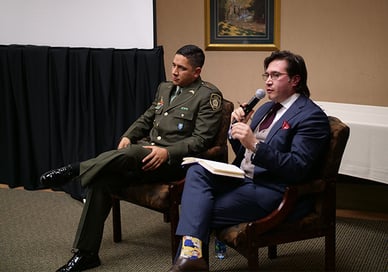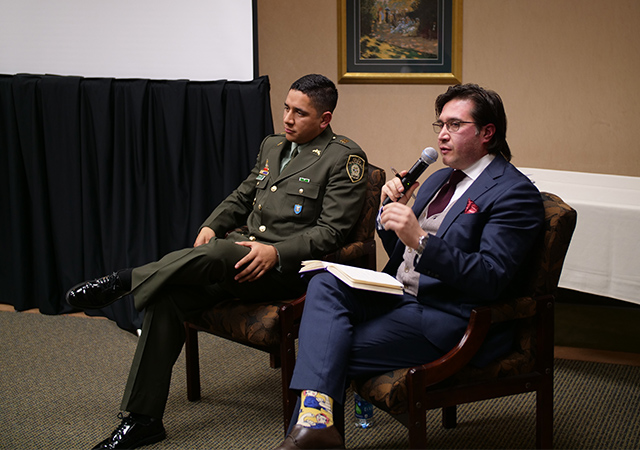What Happens after the Colombian Peace Accord?
 Marcelo Diaz, a representative from the Folke Bernadotte Academy, the Swedish Agency for Peace, Security and Development speaks to the audience in the IPJ on Monday.
Marcelo Diaz, a representative from the Folke Bernadotte Academy, the Swedish Agency for Peace, Security and Development speaks to the audience in the IPJ on Monday.
After decades of civil war, the 2016 Havana Peace Talks between the Colombian government and the FARC-EP guerilla group resulted in the implementation of key security points. From the agreement, the Colombian National Police were tasked with this implementation responsibility and, over a year later, the question is, what has happened since?
On April 30, the Joan B. Kroc School of Peace Studies hosted “What Happens After the Peace Accord?: A Talk with the Peacebuilding Unit of the Colombian National Police.” The event, which took place fittingly in the institute dedicated to fostering worldwide peace, enabled audience members to hear from Jose Luis Escalante Hernandez, a captain of the National Police of Colombia, and Marcelo Diaz, a representative from the Folke Bernadotte Academy, the Swedish Agency for Peace, Security and Development.
They also learned what has happened in Colombia since the accord and how different actors involved in the process are looking forward. A discussion of where peace will take the country, the event provided an optimistic look at a future where armed conflict ceases to exist in Colombia.
Reconciliation, community, and inclusivity were the themes of the program with Hernandez, who represented Brigadier General Álvaro Pico Malaver, who is the head of the Peacebuilding Unit UNIPEP (La Unidad Policial para la Edificación de la Paz), speaking about the importance of a positive peace in Colombia, one brought about by creating social systems that promote justice.
As a police captain, Hernandez stressed that the Colombian police will need to play a key role in creating the positive peace — a peace built to last through institutional and cultural changes. For him, the entire country has to evolve because of the conflict, learning to change their minds and adjust, in order to move forward after years of destruction and death.
For Diaz, the Colombian peace accord is truly an inclusive agreement, since it aims to bring together all members of society to create a lasting and fair path to sustainable peace. Diaz, who was involved in the peace talks, stressed the importance of recognizing that “conflict affects people differently,” and that “the challenge is to go from words to action.”
Monday's event was planned by Kait Dugan, a graduating master's degree candidate in USD's Peace and Justice program, in connection with work she's done with UNIPEP and the NGO, Interpeace, in Bogotá as well as her master's capstone. Her capstone is titled, "Rural and Urban Community Trust in The National Police in Post-Conflict Colombia: A Pilot Study for Collaborative Trust Building."
— Allyson Meyer ‘16
Contact:
USD News Center
news@sandiego.edu
(619) 260-4681

About the Author
The Joan B. Kroc School of Peace Studies (Kroc School) at the University of San Diego is the global hub for peacebuilding and social innovation. Founded in 2007, the Kroc School equips the next generation of innovative changemakers to shape more peaceful and just societies. We offer master's degrees in peace and justice, social innovation, humanitarian action, conflict management and resolution, and a dual degree in peace and law — programs that have attracted diverse and dynamic students from more than 50 countries. In addition to our graduate programs, the Kroc School is home to the Kroc Institute for Peace and Justice (Kroc IPJ). Founded in 2001, the Institute supports positive change beyond the classroom. Through groundbreaking research, experiential learning, and forward-thinking programs, the Kroc School and Kroc IPJ are shaping a future in which peaceful co-existence is the new normal.






